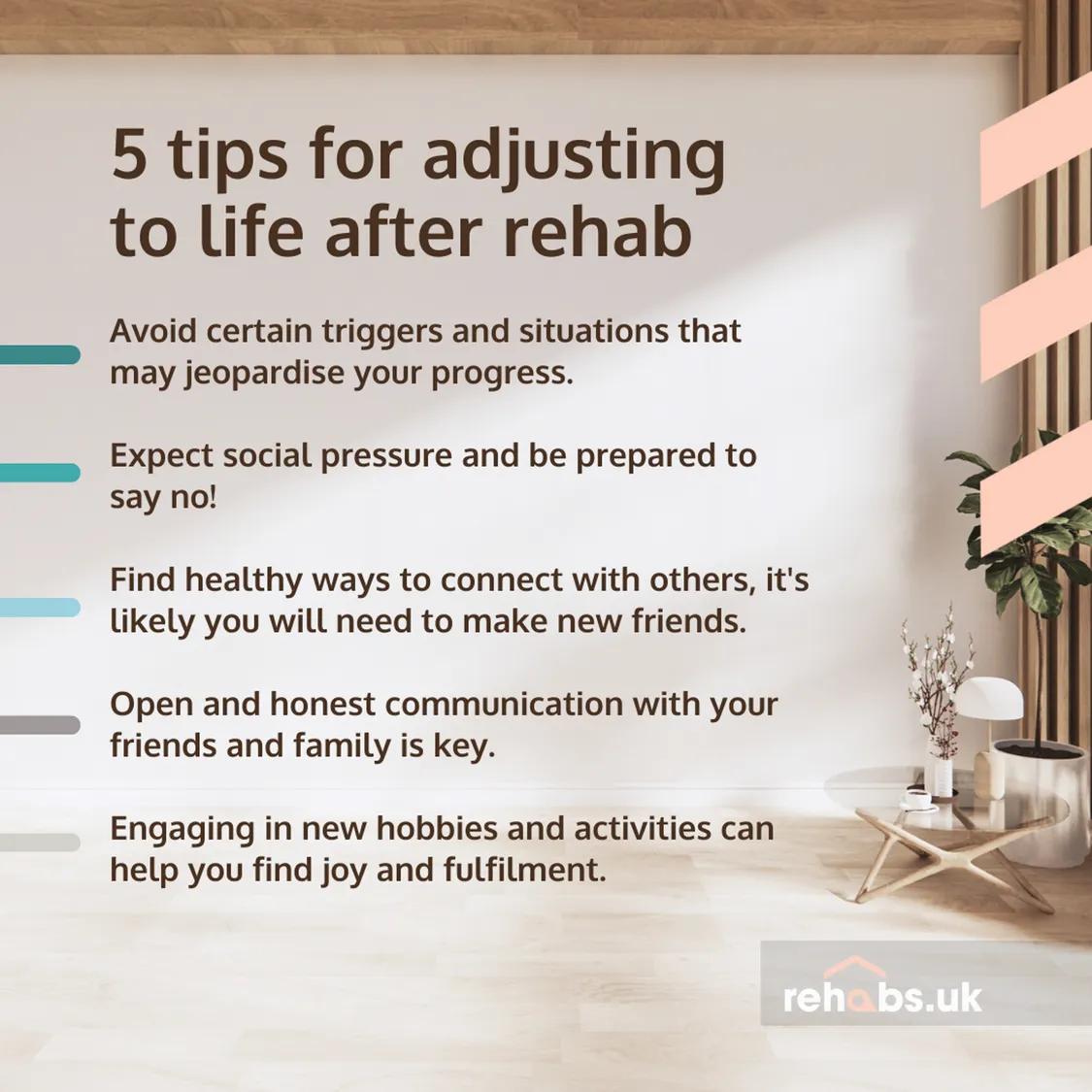07 Jul 2023
Life after rehab: adjusting and preventing relapse
Recovering from addiction is a challenging and courageous journey. Many individuals often view rehab as a magic cure that will solve all their problems. However, it is essential to understand that rehab is just the first step towards a long-lasting recovery. Adjusting to life after rehab and preventing relapse requires ongoing effort and commitment.
Recovery continues after rehab
Rehabilitation programmes provide a solid foundation for recovery, but they do not guarantee lifelong sobriety on their own. It is crucial to acknowledge that recovery is an ongoing process that extends beyond the confines of a rehab facility. After completing a rehab programme, individuals must actively work towards their continued recovery.
Post-rehab challenges to recovery
Social pressure
Social pressure can be a significant challenge in maintaining sobriety after rehab. People in social settings may offer drugs or alcohol, unaware of an individual's commitment to recovery. There may also be a tendency to sober shame. To navigate this challenge:
- Surround yourself with supportive friends and family who understand your goals and respect your sobriety.
- Communicate your boundaries and the importance of sobriety to those around you.
- Develop an exit strategy if you find yourself in a situation that compromises your recovery.
Isolation after rehab
After rehab, individuals may experience feelings of isolation or loneliness. They may have to rebuild their social circle or distance themselves from negative influences. Coping with isolation can be easier with the following steps:
- Engage in support groups or alumni programs where you can connect with others who have similar experiences.
- Seek out new hobbies or activities that promote social interaction and personal growth.
- Maintain regular communication with your therapist or counsellor to address any feelings of isolation and develop coping strategies.
Dealing with mental health after rehab
Mental health issues often coexist with addiction. After rehab, it is essential to prioritise mental health and seek appropriate support:
- Establish a comprehensive aftercare plan that includes ongoing therapy or counselling sessions.
- Practice self-care techniques such as exercise, meditation, and maintaining a healthy routine.
- Reach out to mental health professionals who specialise in addiction and co-occurring disorders for additional support.
Methods for helping to prevent relapse after rehab

Joining a post-rehab alumni programme
Post-rehab alumni programmes offer continued support and connection with individuals who have completed rehab. Benefits of joining such programmes include:
- Access to a supportive community that understands the challenges of recovery.
- Opportunities for ongoing education, workshops, and skill-building sessions.
- Mentorship from individuals who have successfully maintained sobriety.
Communicating with friends and family
Open and honest communication with friends and family is crucial in preventing relapse. Consider the following steps:
- Educate your loved ones about addiction and the challenges of recovery.
- Share your goals, triggers, and boundaries with those close to you.
- Seek their support and encourage them to participate in family therapy or support groups.
- Consider IMAGO couples Therapy which can support reconnection for relationships that may have drifted due to conflict around the individuals addiction.
Try out new hobbies
Engaging in new hobbies and activities can provide a healthy outlet for emotions and help prevent relapse. Here's how:
- Explore activities that align with your interests and passions.
- Engage in physical activities or sports to promote physical and mental well-being.
- Cultivate new hobbies that stimulate creativity and promote personal growth.
Available treatment for after rehab
12 step programmes
12-step programmes offer a structured approach to recovery. These programmes emphasise:
- Fellowship and support from individuals who have walked the same path.
- Accountability through regular meetings and working through the 12 steps.
- Spiritual growth and a higher power as a source of strength.
Individual post-rehab therapy
Individual therapy provides a safe space for addressing specific challenges and working through underlying issues. Benefits of individual therapy include:
- Tailored treatment plans designed to meet your unique needs.
- Identifying and addressing underlying emotional or psychological factors contributing to addiction.
- Developing coping skills and relapse prevention strategies.
Support groups for recovering addicts and loved ones
Support groups, such as Alcoholics Anonymous (AA) and Narcotics Anonymous (NA), offer a community-based approach to recovery. Benefits of support groups and getting involved in aftercare include:
- Peer support and shared experiences.
- Learning from others who have successfully navigated similar challenges.
- Building a network of support outside of formal treatment settings.

Getting help is the first step
Taking the first step towards recovery is crucial. We understand that each individual's journey is unique, and additional challenges may arise after rehab If you or a loved one is struggling with addiction, reach out to Rehabs UK today.
Our team of professionals can help you address any specific challenges you may face and provide tailored guidance to ensure a successful recovery. Our compassionate and experienced team is here to provide support, guidance, and the resources you need to embark on a successful journey of recovery. Remember, you are not alone, and a healthier, happier life is within reach.
